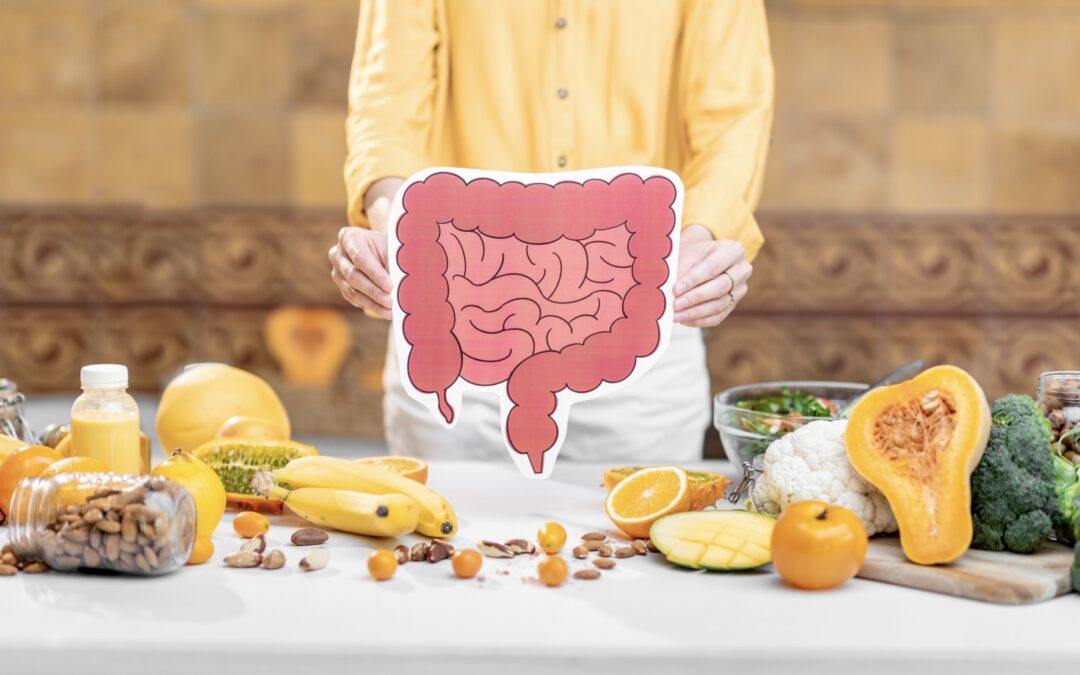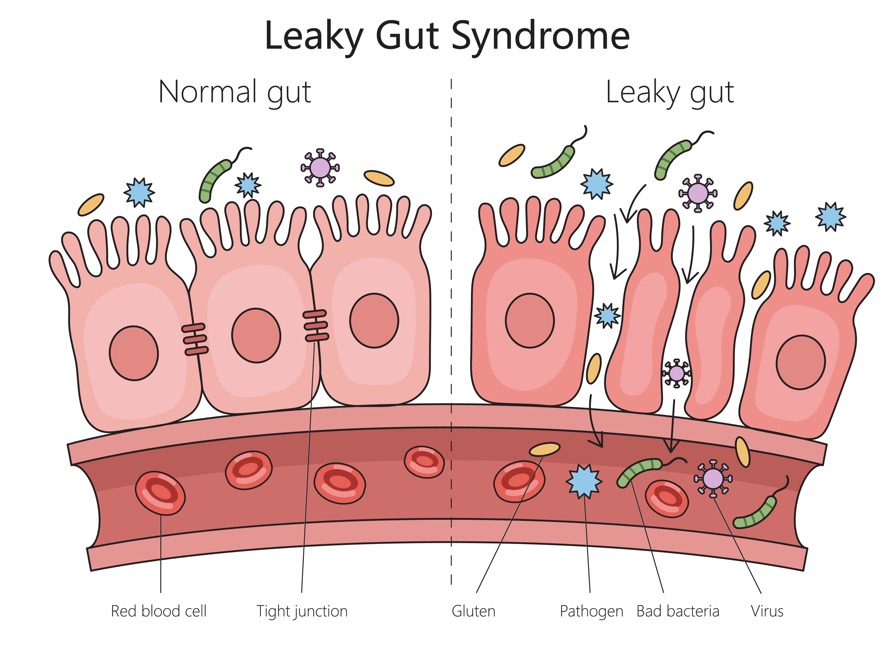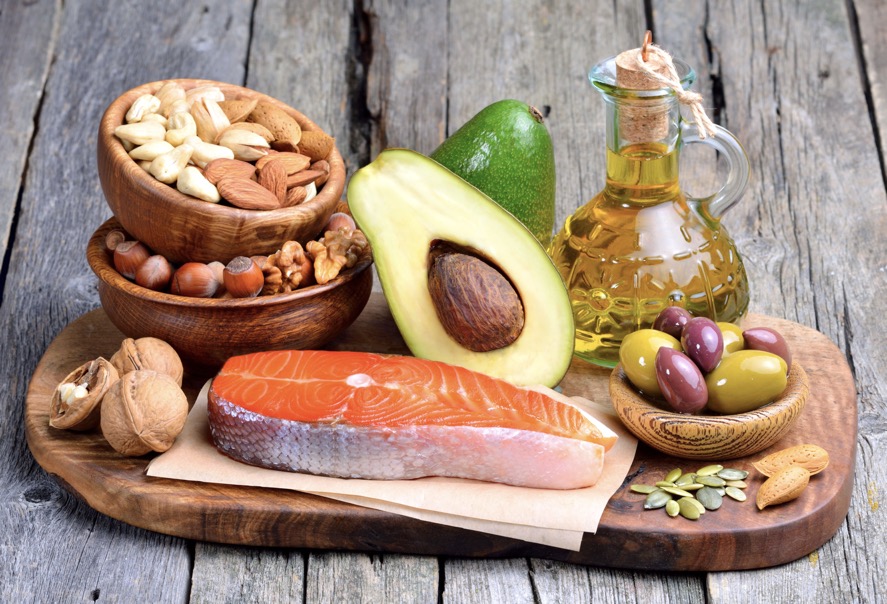If you’ve been struggling with digestive discomfort, fatigue, or unexplained inflammation, you may have heard about “leaky gut”—a term for increased intestinal permeability. While leaky gut is not a disease itself, it can contribute to a range of health issues when the gut lining becomes compromised. Fortunately, natural treatments for leaky gut, including targeted dietary changes, specific supplements, and mindful lifestyle adjustments, can help restore your gut barrier and support overall well-being.
What is a leaky gut?
Although the phrase “leaky gut” conjures a mental image of a punctured pipe, it’s a lay term for intestinal permeability. Sticking with the plumbing analogy, imagine your digestive system as a long tube running from your mouth to your butt. The inner lining of this tube separates the contents of the digestive tract from the rest of the body. This lining, known as the intestinal barrier, contains channels that selectively allow nutrients and other substances to pass from the digestive system into the blood. The intestinal barrier is composed of adjoining cells locked into place with tight junctions.
In a healthy gut, the tight junctions keep the cells locked into place, and undesirable substances cannot pass. When these junctions become “leaky”, they allow food antigens and lipopolysaccharides (LPS) from gram-negative bacteria to pass from the digestive tract into the blood. The antigens and LPS are endotoxins which trigger the immune system and cause low-grade inflammation.
What causes a leaky gut?
The intestinal barrier is not like a tap, which is either off (no leaky gut) or on (lots of leaky gut). A certain level of intestinal permeability is normal. Low-level, transient leaky gut is present in healthy individuals when there’s an infection in the gut (this helps flush out bacteria) and in pregnant women to transfer immune substances between the mother and the foetus.
A leaky gut only becomes a problem when there’s too much for too long. It’s also important to note that generally, more than one of the following conditions must be present for it to become an issue.
Things that contribute to increased intestinal permeability
- Food intolerances (gluten, lactose)
- Western-style diet (high sugar, high fat, high fructose, high animal protein)
- Inadequate protein
- Poor protein digestion (often due to low stomach acid)
- Food additives (glucose, salt, emulsifiers, artificial colours)
- Alcohol (> one standard drink per day)
- Glyphosate (Roundup) exposure
- Viruses (Epstein Barr, Covid-19)
- Medications, including non-steroidal anti-inflammatories (NSAIDs), antibiotics, and Methotrexate)
- Autoimmune diseases (Crohn’s, Inflammatory Bowel Disease, Coeliac disease, Type 1 diabetes)
- Nutrient deficiencies (Vitamin D, zinc, glutamine and tryptophan)
- Acute psychological stress
- Endurance exercise of more than two hours
- Acoustic stress such as loud music or construction noise
- Ageing
How does a leaky gut impact health?
Intestinal permeability has been linked to many health conditions, including
- Inflammatory bowel disease
- Irritable bowel syndrome
- Cardiovascular disease
- Type-2 diabetes
- Non-alcoholic fatty liver disease
- Coeliac disease
- Rheumatoid arthritis
- Psoriasis
- Acne
- Mood disorders
Are there signs and symptoms of a leaky gut?
It’s important to note that a leaky gut is not considered to be a disease in and of itself but rather a consequence of unfavourable conditions in the digestive system. There is a myriad of possible signs and symptoms relating to the underlying drivers, and these often overlap with signs and symptoms of other conditions. Some of the symptoms that may be experienced with a leaky gut include
- Bloating, nausea, abdominal pain, indigestion and altered bowel motions
- Fatigue
- Joint pain
- Brain fog and difficulty concentrating
- Headaches and migraines
- Skin rashes, eczema, acne, psoriasis
- Food sensitivities
Is there a test for leaky gut?
At present, there is a lack of consensus about a “gold standard” test for intestinal permeability. Current tests include the lactulose-mannitol test, serum zonulin, and stool zonulin. (Zonulin is a protein that loosens the tight junctions). Each of these has limitations. Clinically, functional stool testing provides a better picture of the health of the digestive tract.
Tips to fix your leaky gut
The linking factor with many of the contributors to increased intestinal permeability mentioned above is an imbalance in beneficial gut bacteria, a dysbiotic microbiome. This is good news. While we have no control over factors like ageing and only minimal control over virus exposure, we can easily and relatively quickly create a thriving gut microbiome with a few simple dietary and lifestyle changes. The even better news is that the foundational support of your good gut bugs does not require a massive financial outlay but rather a commitment to some dietary and lifestyle changes. This empowerment is key to taking control of your health and healing your gut.
The two significant determinants of a healthy gut are the food we eat and how we cope with stress.
Foods to fix leaky gut
The big picture in terms of this is a consistently healthy diet pattern with a wide variety of nutritious foods
- Around 30g/day of different types of fibre from fruit and vegetables and whole grains. Try to source pesticide-free produce where possible
- Adequate amounts of protein without having excess animal protein.
- Sufficient amounts of healthy fats from nuts, seeds, avocado and oily fish
- Eliminate refined grains, sugar, excessive saturated animal fats
- Limit exposure to food additives
- Limit alcohol to no more than one standard drink per day.
The Mediterranean diet fits the above pattern.
Foods to limit
In general, I am not a fan of long-term elimination of foods unless you have a diagnosed allergy (gluten for people with coeliac disease or are anaphylactic to nuts or shellfish). However, as a short-term healing strategy, it can be helpful to temporarily eliminate certain foods that you are intolerant to, promoting a speedier recovery.
Foods to include
Polyphenols are components of plants with recognised gut health benefits. They include
Quercetin – Apples, black and green tea, broccoli (and other brassica vegetables), onions, buckwheat, citrus fruits. Apples are a big winner here as they contain pectin, another important fibre for gut health.
Epigallocatechin gallate (ECGC) – green tea, blackberries, sour cherries, peaches, nectarines
Anthocyanidins – basil, blackberries, blueberries, cherries, cacao, green tea, grapes, mint, pecans, almonds, pomegranate, purple corn, red onions, red cabbage, rosemary, sage, walnuts
Naringenin – citrus peel, tomatoes
Genistein – Alfalfa sprouts, chickpeas, flaxseeds, peanuts, peas, prunes, raisins, currants, soybeans
Supplements for leaky gut
There is a role for supplements in reducing leaky gut, but, as the name suggests, they should be used in addition to diet and lifestyle changes, not instead. I recommend consulting with a suitably qualified practitioner to obtain a supplement prescription tailored to your specific needs.
- Zinc carnosine enhances tight junction integrity, and one study has shown that it can mitigate the effects of NSAIDs on the intestinal barrier (1,2).
- Glutamine regulates tight junction proteins, decreases proinflammatory molecules and reduces intestinal endotoxins.
Probiotics for leaky gut
Probiotics enhance tight junction protein and improve mucus production, directly improving gut barrier integrity. They also reduce inflammation and help decrease the production of gram-negative LPS-producing bacteria (3,4).
Probiotic strains which have been shown in research to reduce leaky gut include
- Lactobacillus rhamnosus GG (LGG)
- Lactobacillus plantarum 299v
- VSL#3 (8 strain blend)
Herbal medicine for leaky gut
- Medicinal mushrooms, including Turkey tail, Chag, Reishi, Lion’s mane and Shitake, act as prebiotics and help reduce inflammation.
- Turmeric
- Green tea
- Plantain
- Marshmallow root
- Ginger(5)
Lifestyle support for leaky gut
Stress management
Both physical and psychological stress are detrimental to the intestinal barrier, both directly by affecting the integrity of the tight junctions and indirectly by impacting sleep, reducing stomach acid output, and resulting in poor protein digestion, as well as an increased risk of SIBO.
In the short term, keep exercise duration under two hours and intensity at a moderate level. Make time for plenty of sleep and implement daily stress management techniques and self-care to boost your resilience.
Conclusion
In summary, a certain amount of intestinal permeability is normal. You can reduce the amount of “leakiness” in your gut barrier by implementing some dietary and lifestyle changes. If you’d like more help with navigating your gut health and developing a targeted, practical and affordable treatment plan, I’m available for consultations (Australia only) either online or in my Brisbane clinic.
Read more
How can a Naturopath help with gut health?
How to protect and repair your gut while on antibiotics
5 best herbal teas to relieve bloating
References
(available on request)

Need help with your gut health?
Norelle Hentschel is an experienced gut health Naturopath with a clinic in Stones Corner, Brisbane and Telehealth consults Australia-wide. She has helped many clients treat their digestive conditions and improve their health.
Want more articles like this?
Join us at Your Skin Remedy – the monthly missive for healthy skin from the inside out. Practical, actionable, and informative. Your clear, glowing skin starts here.
PS. Your inbox real estate is precious. Your Skin Remedy is pitch and promo free. I promise. One email a month — that’s it.




